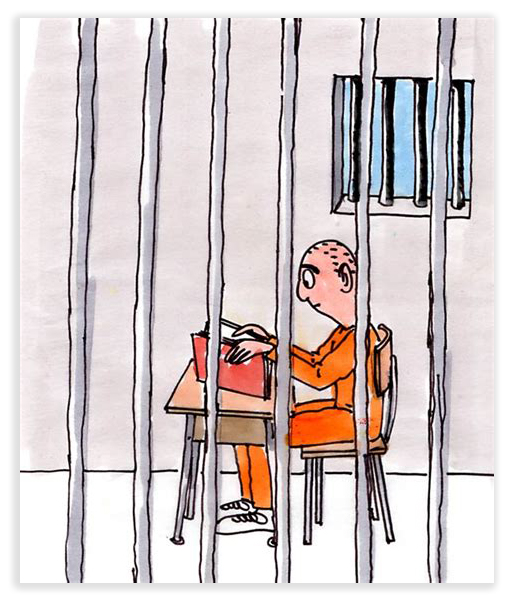We post news and comment on federal criminal justice issues, focused primarily on trial and post-conviction matters, legislative initiatives, and sentencing issues.

BAD NEWS, GOOD NEWS
 The bad news: We have already reported in detail on the error in the First Step Act that accidentally tied the effective date for the additional seven-days-a-year good-conduct time for federal inmates to the effectiveness of the earned-time credits, a pairing that makes as much sense at relating a fish to a bicycle.
The bad news: We have already reported in detail on the error in the First Step Act that accidentally tied the effective date for the additional seven-days-a-year good-conduct time for federal inmates to the effectiveness of the earned-time credits, a pairing that makes as much sense at relating a fish to a bicycle.
Although there has been a hue and cry from all of the usual advocate-suspects, no one has owned up to the blunder, let alone taken steps to fix it.
I’m not often right, but I predicted a month ago that Congress would be uninterested in doing anything to correct the sloppy drafting. This is because Congress, as an institution, addresses a problem once, happily concludes that the problem is all fixed, and then moves on to the next problem. Criminal justice and prison reform got their moment in the sun with passage of First Step. It will be a long time before Congress comes back to the issue. That is all the more true here, because the drafting gaffe will remedy itself in July, when the seven-day credits take effect. Some prisoners who should be home now will surely suffer, but that’s hardly an effect that will fire the imagination of Congress, especially the Senate leadership.
And more: Law professor Nora V. Demleitner, editor of the Federal Sentencing Reporter, complained last week in The Hill that new Attorney General William Barr is no reformer. “Congress should have demanded an attorney general committed to decreasing the federal prison population, improving re-entry, and limiting prison sentences for minor offenders… an attorney general committed to the spirit of the [First Step] Act. Instead it settled for someone who will interpret it as narrowly as possible and implement it grudgingly.”
 The Good News: Speaking last week at a crime symposium, Koch Industries general counsel Mark Holden identified three priorities for the next federal prison reform legislation. Holden, who was point man for Koch Industries’ backing of First Step, said that congress first should apply First Step’s sentencing changes retroactively – the 18 USC 924(c) destacking provision, the reductions in mandatory minimums under the drug trafficking statute, and “safety valve” qualifications.
The Good News: Speaking last week at a crime symposium, Koch Industries general counsel Mark Holden identified three priorities for the next federal prison reform legislation. Holden, who was point man for Koch Industries’ backing of First Step, said that congress first should apply First Step’s sentencing changes retroactively – the 18 USC 924(c) destacking provision, the reductions in mandatory minimums under the drug trafficking statute, and “safety valve” qualifications.
In addition, Holden called on Congress to codify the Supreme Court’s Brady v. Maryland ruling requiring prosecutors share all of the information that they have about the alleged crime with the accused at the outset the case, and to adopt a clearer and more stringent mens rea rule. Also, he urged the Trump administration to reform the executive clemency process and then to apply it to “create second chances for people who wouldn’t necessarily qualify for relief under the First Step Act.”
Meanwhile, a push is on to again make Pell Grants available for prisoners. Complaints that hard-work Americans were paying for criminals to go to college cauaed Congress to prohibit issuing prisoners Pell Grants, which provide students with financial need aid for college. Without Pells, the number of prison college programs plummeted from 772 to just eight by 1997.
In 2015, the US Dept of Education started a pilot program, allowing some colleges to use Pells to increase access to college courses in prison.
 Last week, a conservative magazine called on Congress to expand Pell grants to prisoners nationwide. “Such programming brings gains for both prisoners and public safety,” the American Conservative said, “rebuilds families, is fiscally prudent, and acknowledges the individual dignity of those in prison.”
Last week, a conservative magazine called on Congress to expand Pell grants to prisoners nationwide. “Such programming brings gains for both prisoners and public safety,” the American Conservative said, “rebuilds families, is fiscally prudent, and acknowledges the individual dignity of those in prison.”
It may happen. There has been bipartisan support for legislation to reinstate Pells for prisoners. Sen. Lamar Alexander (R-Tennessee), chairman of the Senate Education and Labor Committee, has hinted the change may be part of reauthorizing the Higher Education Act. “Most prisoners, sooner or later, are released from prison, and no one is helped when they do not have the skills to find a job,” Alexander said last year. “Making Pell Grants available to them in the right circumstances is a good idea.”
The Hill, Barr confirmation reveals shallowness of congressional commitment to justice reform (Feb. 19)
The Crime Report, The First Step Act: It’s Only a ‘First Step’ (Feb. 18)
American Conservative, Sending Our Prisoners to College (Feb. 21)
The Intercept, How The Federal Government Undermines Prison Education (Feb. 18)
– Thomas L. Root








